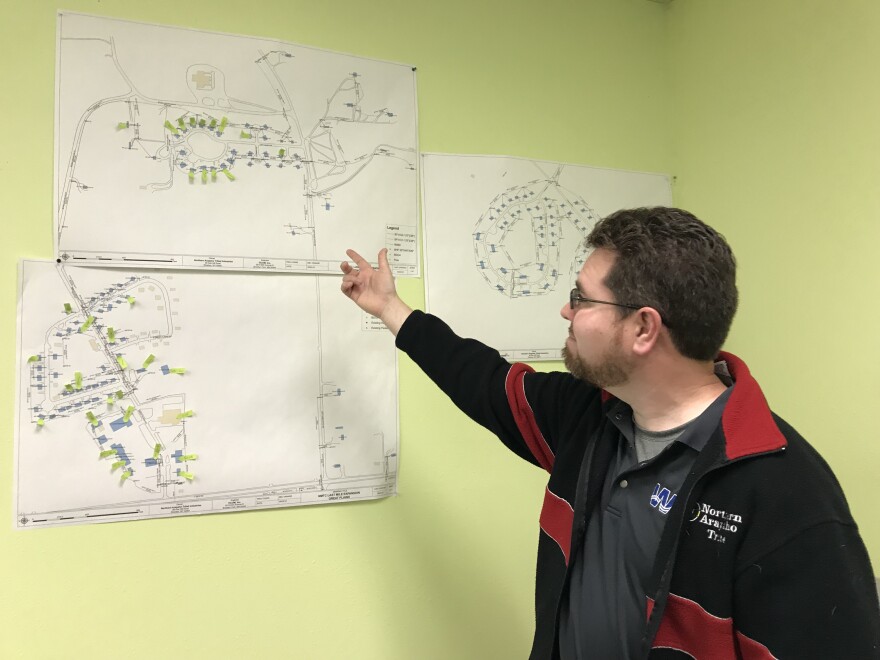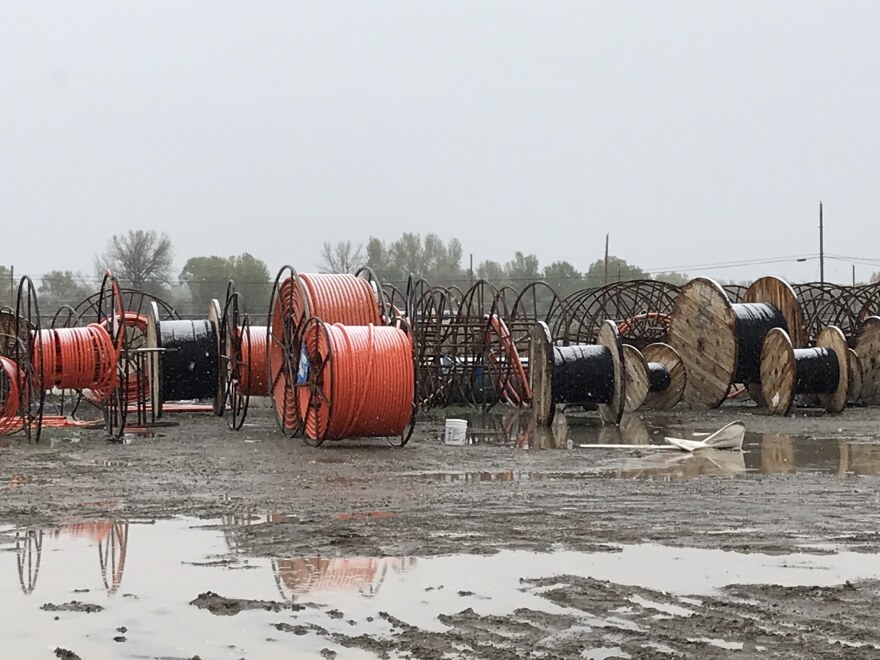It's dumping rain the day Patrick Lawson gives me a tour around Wind River Internet's warehouse. Through an open garage door, you can see giant yellow spools of fiber optics lines. He points out a pile of orange plastic signs.
"These are the markers you'll see around the reservation and Riverton," he says. "But you'll see the little tribal logo on it, and it says, 'Warning: Fiber Optic Cable.' That means, if you see that, you can probably get internet from us."
Lawson is the head IT guy for the entire Northern Arapaho Tribe, and that's saying something because the tribe is one of only 14 in the country that is their own telecommunications carrier. About a decade ago, they started this business to offer its members fixed wireless internet because none of the other big telecommunications carriers would.
"It's not appealing for providers to come in and go to individual residents' homes. Usually what they do is come in and go to just like the schools or clinics or the places with the bigger pockets. They kind of leave the others behind," Lawson says.
The tribe is over 10,000 strong spread across 1.8 million acres, so getting internet to each and every home is a daunting task. But that's exactly what the Northern Arapaho plan to do in the next ten years. Lawson shows me a map of the reservation.
"All those little purple dots are houses and are 'homes passed.' So we're running a dedicated fiber optic cable passed every single one of those homes."
Lawson says this could help the tribe in so many ways: help entrepreneurs sell their wares on a global market, give kids faster video games to play or put a doctor right in someone's home. That last one is especially important since it could help reduce health disparities on Wind River where the life expectancy is only 54 years old.
"You could have a Denver person operating on someone in Riverton," Lawson says. "They could do it remotely, which I think would be amazing."

High-speed internet could also put teachers in people's homes, and distance learning is something Central Wyoming College in Riverton is chomping at the bit to offer. Vice President of Student Affairs Coralina Daly says tribal students often struggle to make it to class.
"Sometimes it can be 15 people that are relying on the same vehicle and if somebody has to go to a medical appointment in Billings, you're not coming to class that day," Daly says. "And so, it's really a heartbreak when that's what gets in the way."
Daly says if those students could access class from a computer screen in their home, more students would succeed.
But there are some hurdles to bringing fiber optics to the reservation.
"Telephone companies typically do not know how to interact or interface with tribal governments and thus decide to build around," says Tolowa tribal member Forest James, CEO of EnerTribe, an organization that mediates with tribal governments on economic development projects like these. He says he's seen that fiber optics is a lifeline for Native communities.
"Now they have tribal members moving back to the reservation because they can continue their education right there at home and contribute," says James. "I think one of the biggest challenges we have in Indian Country is getting our members, our citizens, to come back home, offer them jobs, if they do, and to be able to keep them.
James is working with the tribes and Union Wireless, a family owned carrier serving Wyoming and parts of the Mountain West. He says he's gotten a lot of fiber optics projects off the ground, but this has been truly unique.
"The idea of a public/private partnership between two tribal governments and a local telephone company, of which the local telephone company is paying for the infrastructure? It is almost unheard of and such a wonderful example that I want to duplicate it.
Forest says the stars aligned to make it happen. In the last few years, the two Wind River Tribes have become more motivated to collaborate with each other, and Union Wireless has an unusual mindset.
"They operate in a very principally-driven manner, which is needed in Indian Country. Working with tribes you essentially have to contribute to the community," says James.
But Brian Woody with Union Wireless says, "When we went into this, I believe I told both Business Councils that Union was not being altruistic in its intentions here. We expect to get something out of it."
That "something" they want is 25 years of access to the fiber optics infrastructure they plan to give to each tribe. That would expand their network to give them access to more customers-on the reservation and beyond.
"For us every customer matters, so we work really hard and strive hard to earn our customers business," says Woody. "Even if it's over a mountain range, they're still kind of our neighbors and we still need to try to take care of them the best we can."
That's a challenge regionwide. 39 percent of rural America lacks access to high speed internet; in urban America it's only four percent. The projects on Wind River could be a good template for connecting homes across the West.
For Wind River Internet's Patrick Lawson, his goal isn't just to be on par with the reservation's neighboring communities, "That's not good enough. If it's only a little bit more to increase things from ten times better to being 100 times better, let's aim for that 100 times better. And ask why not do something 1000 times better."
Construction on the two projects is expected to start next spring.
(Union Wireless is an underwriter for Wyoming Public Radio.)








